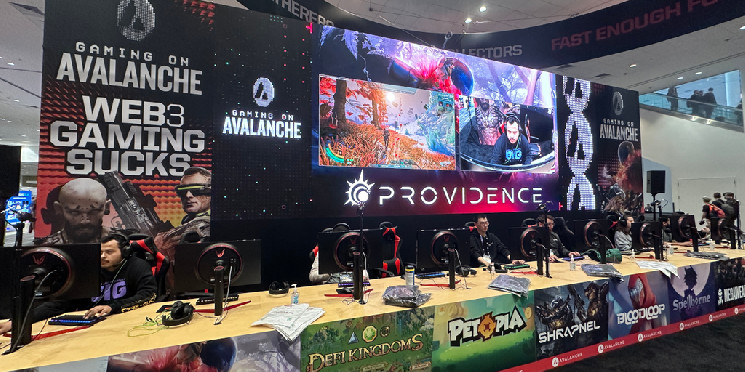“Web3 gaming sucks.” It’s a common refrain amongst many gamers who have thumbed their nose at the growing space, but it’s not something you’d expect the team behind a prominent blockchain network to recite around one of the industry’s biggest events.
But that’s exactly what Ava Labs did last week at the Game Developers Conference, where the phrase was plastered all over the massive Avalanche Gaming booth and across banners that could be seen from all over the expo hall and as attendees went down the escalator. Talk about a conversation starter.
While the tongue-in-cheek branding probably drew snickers from crypto haters who found it to be dead-on, the booth also appeared to draw a steady crowd of people who came to play prominent Avalanche games, hang out, and network. And it earned rave reviews from Web3 builders across all sorts of chains.
Interestingly, the concept was first pitched before last year’s GDC event in San Francisco, but Ava Labs didn’t feel confident enough in the premise then.
Honestly, @avax didn’t have to go THIS HARD at GDC. pic.twitter.com/ZoJhV7nTH1
— Easy (@EasyEatsBodega) March 20, 2024
“We didn’t do it last year because, truthfully, we didn’t feel strong enough,” Ava Labs Senior Marketing Manager Andrew “Coop” Cooper told Decrypt‘s GG from the show floor. “We didn’t feel like we had enough support and the great games, and so it had another year to develop.”
“This year felt right,” he added, “because we’ve come a long way both in game development and our community.”
Ava Labs used the booth to showcase up-and-coming games such as the first-person extraction shooter Shrapnel, along with Overwatch-esque hero shooter BloodLoop and the survival game Providence.
All three look like AAA-level experiences, and we’ve already played and were impressed by the early access build of Shrapnel that’s available on the Epic Games Store. Each game got its own dedicated day during the event, letting players check them out on the gaming PCs at the booth while members of each development team were on hand to chat and promote their games.
Crypto gaming perceptions are largely informed by the games that were playable back in 2021 when the NFT market exploded, and the monster-battling game Axie Infinity defined the initial play-to-earn phenomenon. Early games were simple and often repetitive and felt more like DeFi apps dressed up as video games.
But quality games take a long time to develop. Games that were announced and funded in 2021 and 2022 are starting to emerge as more cohesive and compelling experiences. Shrapnel is one of them, on Avalanche, as are card-battler Parallel on Ethereum and farming game Pixels on Ethereum scaler Ronin.
Thank you, GDC.
Web3 gaming s̶u̶c̶k̶s̶ is inevitable. 🔺 pic.twitter.com/aflqBs8Oca
— Avalanche Gaming 🔺 (@GamingOnAvax) March 22, 2024
Cooper and team saw the GDC campaign as an opportunity to embrace the skepticism they’d face at a traditional gaming event like that—and try to change a few minds in the process by showcasing games that are richer and more fleshed-out than some might expect.
“I think we really are getting closer to games that maybe other people will want to play just because it’s a great game,” said Cooper. “In terms of risk/reward, we felt really confident about [the campaign] this year because we had noodled on it for a year and felt good.
“Of course, there was a risk that it flopped,” he added.
While Ava Labs might not have convinced all the doubters at one event, the Avalanche Gaming booth’s vibes appeared to land well with attendees. Amid a tough time in the broader gaming industry with sizable layoffs across traditional studios, Cooper said that more developers appeared open to embracing new business and distribution models.
The Avalanche Gaming booth at GDC 2024. Photo: Ava Labs
If anything, Ava Labs aimed to have fun with the activation and make sure that attendees could have fun, as well. Cooper said that Foundation and Labs teams around blockchain networks are often focused on tech and engineering, but gamers want entertainment—and they want quality games. Even at a dev-centric event, that embrace appeared to work out.
“They get really deep into that tech, and I think we’re lacking something that we’ve done well here—which is like: Just be fun and have something that’s exciting,” he said. “Marketing isn’t about your technology only, right? It’s about giving people something fun to do.”

